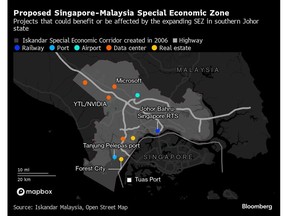Article content
(Bloomberg) — The leaders of Malaysia and Singapore are set to formalize an agreement establishing a special economic zone linking their two nations’ border region, but the prospects for immediate economic benefits may hinge on implementation of a deal that has seen repeated delays since talks began in 2023.
Article content
Malaysia Prime Minister Anwar Ibrahim and Singapore Prime Minister Lawrence Wong will officiate a ceremony on Tuesday for the economic zone in Malaysia’s southern state of Johor — which shares one of the world’s busiest border crossings with Singapore. The signing was postponed to January after Wong contracted Covid.
Article content
While details of the agreement have been scarce, officials in Johor have previously said they expect the zone to create as many as 100,000 new jobs and add $26 billion per year to the Malaysian economy by 2030. Much of that would likely come from new investment and Singapore-based firms expanding or shifting production to Johor, which has more land and a larger employment base to draw on than the city-state.
If carried out effectively, the agreement should streamline regulatory processes for permits and approvals, ensure transparent decision-making, and cover broad-based tax incentives, said Asrul Hadi Abdullah Sani, a partner at strategic advisory firm ADA Southeast Asia.
Elusive Goal
Spanning over 3,500 square kilometers (1,350 square miles), the special economic zone is expected to be more than four times larger than Singapore and nearly twice the size of China’s Shenzhen — the city bordering Hong Kong whose success Malaysia is hoping to emulate with the SEZ.
Yet strengthening ties between Johor and Singapore has proven elusive in the past. Over 300,000 people cross the Johor-Singapore land border everyday, most of them for work, and traffic on the two causeways linking the nations often cause hours-long delays.
Article content
A previous effort to knit the region together — including through a more than $20 billion high-speed rail project — stalled because of disagreements over costs and other hurdles.
“There are concerns regarding bureaucratic capacity and the management of expectations for businesses crossing the border into Johor,” Asrul Hadi said in an interview ahead of the signing ceremony.
Johor’s proximity to Singapore has long been one of its biggest assets. That was shown most recently by a boom in data centers in the Malaysian state, the result of Singapore’s moratorium on the construction of new data centers from 2019-2022, in part over concerns about energy supplies.
Read: Singapore, Malaysia Aim to Copy Shenzhen’s Success With Mega-Hub
A memorandum of understanding signed in January 2024 contained few details apart from clearly defined goals for facilitating the cross-border movement of people — which includes passport-free travel and QR-code-based clearance systems. But Malaysia has struggled to roll out a digital vehicle entry permit system and has only started trials for QR-code clearances at its checkpoints — programs already implemented at scale by Singapore.
Article content
Furthermore, some analysts said it’s unclear if both countries have made enough progress on streamlining investment and tax policies to truly catalyze fresh investment. Singapore has the region’s lowest corporate income tax rate at 17%, compared to 24% in Malaysia.
“The draw of the special economic zone is likely to be tax incentives,” said Yvonne Beh, a partner at Kuala Lumpur-based law firm Wong & Partners. “For companies looking to use Johor as a supply chain hub for the region, customs duties and sales tax exemptions would be the least that would be expected before they consider setting up a hub in Johor.”
—With assistance from Anisah Shukry and Kok Leong Chan.
Share this article in your social network

Comments